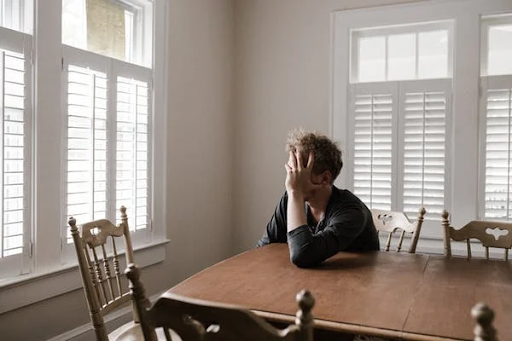Finding Hope in the Darkness: Overcoming Depression and Anxiety
Tips for overcoming depression
Depression is a serious mental health condition that affects millions of people worldwide. It can make you feel hopeless, alone, and overwhelmed. However, it is important to remember that there is hope and that you are not alone in your struggles. Here are some tips for overcoming depression:
1. Seek professional help
The first step in overcoming depression is to seek professional help. A mental health professional such as a therapist or psychiatrist can provide you with the necessary support and guidance to navigate through your depression. They can help you develop coping mechanisms, suggest treatment options, and provide a safe space to express your feelings.
2. Build a support network
Depression can often make you feel isolated and alone. It is crucial to reach out to your loved ones and build a support network. Surround yourself with people who understand and support you. Talking to someone you trust about your feelings can provide relief and help you feel understood.
3. Practice self-care
Engaging in self-care activities can help alleviate some of the symptoms of depression. Make sure to prioritize activities that bring you joy and relaxation. This can include anything from taking a bath, going for a walk in nature, practicing mindfulness or meditation, or engaging in a hobby you enjoy. Remember to be gentle with yourself and take time to rest.
4. Create a routine
Depression can make it difficult to find motivation or structure in your daily life. Creating a routine can help provide a sense of stability and purpose. Set small, achievable goals for yourself each day. This can be something as simple as getting out of bed, taking a shower, or going for a short walk. Celebrate each accomplishment, no matter how small.
5. Challenge negative thoughts
Depression often comes with negative thoughts and self-critical thinking patterns. It is important to challenge these thoughts and replace them with positive and realistic ones. Keep a journal where you can write down your negative thoughts and reframe them into more positive and helpful statements. This practice can help shift your mindset and reduce the impact of negative thinking.
Strategies for managing anxiety
Anxiety is another common mental health condition that can significantly impact your daily life. It can cause excessive worry, fear, and physical symptoms such as racing heart, sweating, and trembling. Managing anxiety is essential to improve your overall well-being. Here are some strategies that can help:
1. Practice deep breathing and relaxation techniques
Deep breathing and relaxation techniques can help calm your body and mind during moments of anxiety. When you feel anxious, take slow, deep breaths in through your nose and exhale through your mouth. This can help regulate your breathing and activate the body's relaxation response. Additionally, practicing progressive muscle relaxation or guided imagery exercises can further promote a sense of calm.
2. Identify triggers
Understanding what triggers your anxiety can help you better manage and avoid these situations when possible. Keep a journal to track the circumstances, thoughts, or events that precede your anxiety episodes. This can help you identify patterns and make necessary adjustments in your life to minimize exposure to triggers. It may also be helpful to discuss your triggers with a therapist to gain further insights and coping strategies.
3. Incorporate regular exercise
Physical activity has been proven to reduce anxiety symptoms by releasing endorphins and improving overall well-being. Find an exercise routine that works for you and try to incorporate it into your daily life. This can be anything from going for a jog, practicing yoga, or engaging in team sports. Remember that even small amounts of exercise can have a positive impact on your mental health.
4. Practice mindfulness
Mindfulness involves focusing your awareness on the present moment without judgment. Engaging in mindfulness exercises can help reduce anxiety by grounding you in the present and bringing your attention away from worries and future uncertainties. Practice mindfulness through techniques such as meditation, deep breathing, or body scans. Regular practice can enhance your ability to manage anxiety and improve overall well-being.
5. Consider therapy or medication
If your anxiety is significantly impacting your daily life and self-care strategies are not sufficient, consider seeking therapy or medication. A mental health professional can assess your specific needs and recommend appropriate treatment options. Therapy can provide you with tools and techniques to manage anxiety, while medication can help regulate brain chemistry and alleviate symptoms. Discuss these options with a healthcare professional to determine what is best for you.
Overcoming depression and anxiety
Depression and anxiety often coexist and can have a significant impact on a person's life. However, it is important to remember that recovery is possible. While it may seem challenging, there are steps you can take to overcome both depression and anxiety and find hope even in the darkest times.
1. Understanding the connection
Depression and anxiety often go hand in hand. It is not uncommon for individuals to experience symptoms of both conditions simultaneously. Understanding the connection between depression and anxiety can help you better navigate through your journey to recovery. Both conditions involve changes in brain chemistry, and while they may present differently, they often share similar underlying causes and risk factors.
2. Seeking professional help
Both depression and anxiety can benefit from professional intervention. Seeking help from a mental health professional can provide you with the guidance and support needed to overcome these conditions. Therapists can help you develop coping strategies, challenge negative thought patterns, and provide you with a safe space to express your thoughts and emotions. They may also recommend medication if necessary, to help alleviate symptoms.
3. Building a support network
Building a support network is crucial when facing depression and anxiety. Surrounding yourself with individuals who understand and support you can make a significant difference in your recovery journey. Reach out to loved ones, join support groups, or consider online communities where you can connect with others who have similar experiences. Sharing your thoughts and feelings with people who genuinely care can provide a sense of belonging and validation.
4. Embracing self-care
Self-care is essential when dealing with depression and anxiety. Finding activities that bring you joy, relaxation, and a sense of purpose can help improve your overall well-being. Engage in activities that promote self-compassion and nourish your mind, body, and soul. This can include pursuing hobbies, practicing mindfulness or meditation, spending time in nature, or simply taking time for yourself. Remember, self-care is not selfish, but rather a vital part of your recovery journey.
5. Challenging negative thoughts and beliefs
Negative thoughts and beliefs can fuel depression and anxiety. It is crucial to challenge these thoughts and replace them with more positive and realistic ones. Cognitive-behavioral therapy (CBT) is a widely used therapeutic approach that focuses on identifying and challenging negative thinking patterns. It can help you reframe negative thoughts, develop healthier thinking habits, and build resilience.
6. Setting realistic goals
When facing depression and anxiety, setting realistic goals is vital. Start by breaking down larger tasks into smaller, more manageable steps. Celebrate each accomplishment, no matter how small, as each step forward is progress. By setting realistic goals, you can avoid feeling overwhelmed or discouraged, and maintain a sense of achievement throughout your recovery process.
7. Cultivating gratitude and positivity
Practicing gratitude and focusing on the positive aspects of life can help counteract the negative effects of depression and anxiety. Start a gratitude journal and write down things you are grateful for each day. Engage in activities that bring you joy and try to notice the small moments of happiness in your daily life. Cultivating gratitude and positivity can help retrain your brain to focus on the good, even when faced with difficult circumstances.
Finding hope in darkness
Depression and anxiety can make life feel incredibly dark and overwhelming. However, it is important to remember that there is hope, even in the darkest of times. Finding hope involves cultivating a positive mindset, seeking support, and engaging in activities that promote self-care and well-being. Here are some strategies for finding hope in the darkness:
1. Seeking professional support
When facing mental health challenges, seeking professional support is crucial. Mental health professionals are trained to help individuals navigate through their struggles, provide guidance, and offer evidence-based treatment options. They can help you develop coping strategies and provide a safe space to express your feelings and emotions.
2. Sharing your journey with loved ones
Opening up to trusted loved ones about your struggles can provide immense support and validation. Talking to someone you trust about your feelings and experiences can remind you that you are not alone and that there are people who care about your well-being. Their presence and understanding can offer a glimmer of hope and comfort during difficult times.
3. Engaging in activities that bring joy
Engaging in activities that bring you joy and happiness can help counteract the negative effects of depression and anxiety. Find activities that ignite your passion and make you feel alive. This can be anything from pursuing creative hobbies, listening to music, spending time with loved ones, or exploring new interests. By engaging in activities that bring you joy, you allow yourself to experience moments of hope and positivity.
4. Practicing mindfulness and self-compassion
Practicing mindfulness and self-compassion can help you find hope in the present moment. Mindfulness involves paying attention to the present moment without judgment, while self-compassion involves treating yourself with kindness and understanding. By practicing mindfulness and self-compassion, you can cultivate a sense of acceptance and learn to be gentle with yourself, even during difficult times.
5. Setting realistic expectations
When facing depression and anxiety, it is important to set realistic expectations for yourself. Be gentle and patient with yourself throughout your recovery journey. Understand that progress may be slow and that setbacks may occur. By setting realistic expectations, you can avoid unnecessary pressure and maintain a sense of hope and perseverance.
6. Looking for inspiration and role models
When feeling lost in darkness, seeking inspiration from others who have overcome similar challenges can offer hope and motivation. Look for role models, read their stories, or listen to their interviews. Knowing that others have found hope in similar circumstances can remind you that recovery is possible and that brighter days lie ahead. Surround yourself with stories of resilience and strength.
Remember, overcoming depression and anxiety is a journey, and each person's experience is unique. What works for one individual may not work for another. It is essential to find strategies and techniques that resonate with you personally. Don't hesitate to reach out for support and keep searching for hope, even in the darkest of times. You are not alone, and there is always support available to help you overcome depression and anxiety.





